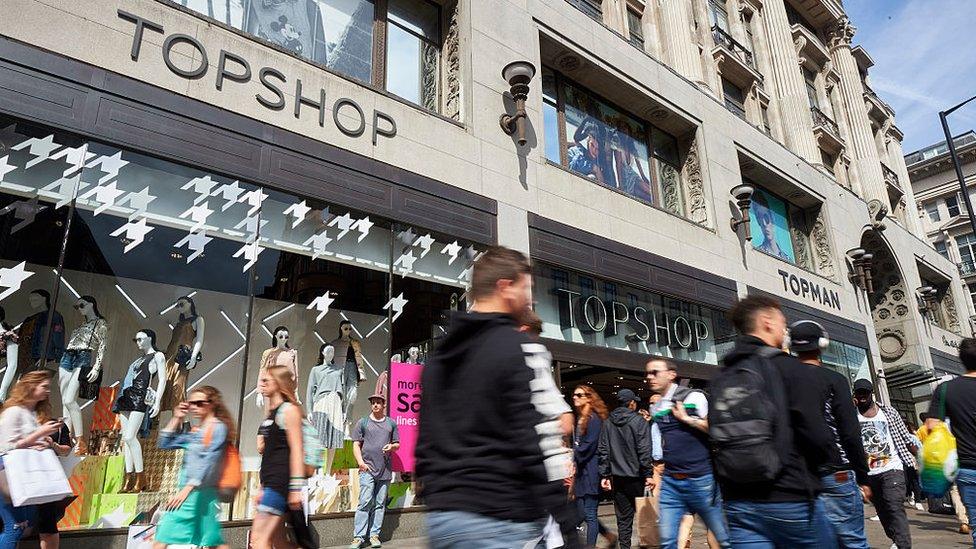Topshop owner’s collapse is 'inevitable'
- Published
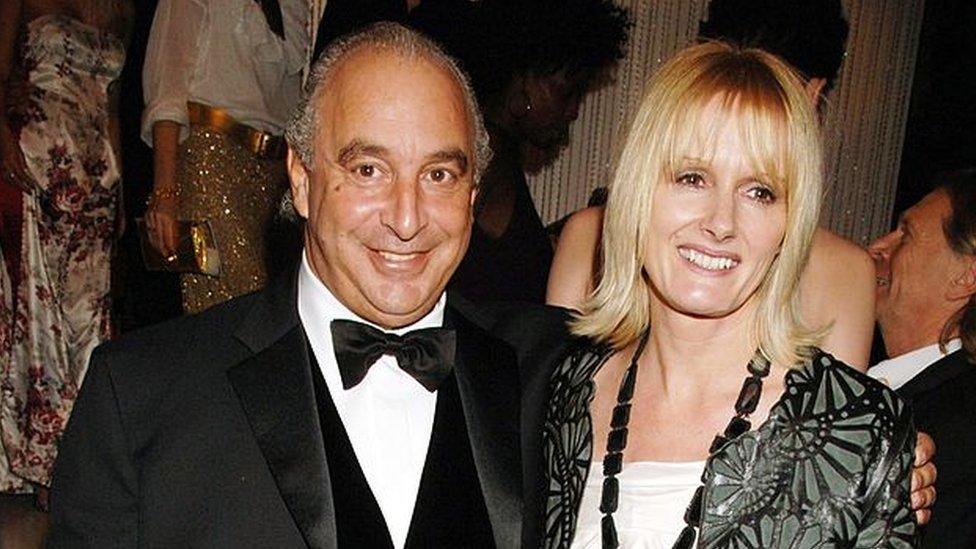
Sir Philip Green and Jane Shepherdson, former director of Topshop, pictured in 2006
Sir Philip Green's failure to invest in his retail empire Arcadia has made its downfall "inevitable", a former boss of its best-known brand Topshop has said.
Arcadia, which includes Topshop, Burton and Dorothy Perkins, is facing collapse putting 13,000 jobs at risk.
Jane Shepherdson CBE, credited with turning Topshop into a global brand, said she expected an online retailer to buy the brand and close most stores.
Arcadia had been seeking extra cash following lost sales amid the pandemic.
But Ms Shepherdson, who ran Topshop until 2006, said that its problems went back much further than the coronavirus outbreak.
She told the BBC's World at One programme that Sir Philip had ignored the rise of online shopping, and was now lumbered with a large and expensive store estate which was largely shut due to Covid.
"In addition to that I think the fact that he absolutely declined to invest all of the businesses [in Arcadia] means it was pretty much inevitable [it would fail]."
She said the "most likely scenario" for Topshop was that an online retailer would buy the brand, add it to their own portfolio and close most of the stores.
"It's incredibly sad… the worst thing is for all of the store staff, which are mostly women who are going to be unemployed.
"The supply chains are also going to take a massive hit. I imagine that orders will start to be cancelled very, very shortly."
Ms Shepherdson also accused Sir Philip of being a bully when she worked for him, adding that he used "to shout at people all the time, he was disrespectful, dismissive, rude".
"The reason I left was I spent five years keeping him at arm's length from what I considered to be my business, Topshop, and I realised at that point that I couldn't keep him at arm's length any longer and I would actually have to work with him if I stayed and I absolutely didn't want to do that."
The BBC has asked Sir Philip for a comment.
What is happening?
Arcadia is a sprawling retail business that owns a chunk of the High Street's fashion brands, including Miss Selfridge, Topman, Wallis and Evans.
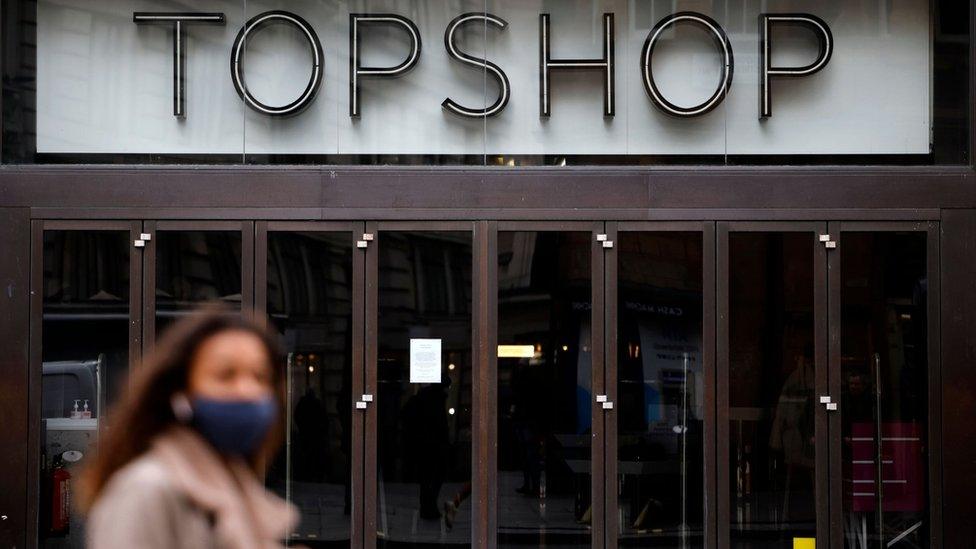
Questions over the future of Sir Philip's retail empire were raised on Friday, after it emerged that talks with potential lenders for a £30m loan had failed.
Arcadia was seeking extra cash as coronavirus had caused "a material impact on trading" across its businesses, it said.
It now needs a breathing space from its creditors and, to gain that, is expected to file for administration.
Administration gives a business protection from its creditors while it is put back on an even keel, or while parts or all of it are sold off.
It needs the court to grant the appointment of specialist insolvency practitioners, who then look at the best way of raising money to repay its debts, keeping the business or parts of the business going if possible. The process can take up to a year.
What has gone wrong?
Even before coronavirus, Arcadia's best-known names were struggling against newer, online-only fashion retailers such as Asos, Boohoo and Pretty Little Thing.
Former City minister and once chairman of Marks and Spencer, Paul Myners, told the BBC: "Covid has obviously been a significant factor but the truth is this group of brands has been haemorrhaging now for 15 years. It's become an insignificance.
"Sir Philip never really accepted the opportunity or challenge of online trading. He made no investment in that area at all."
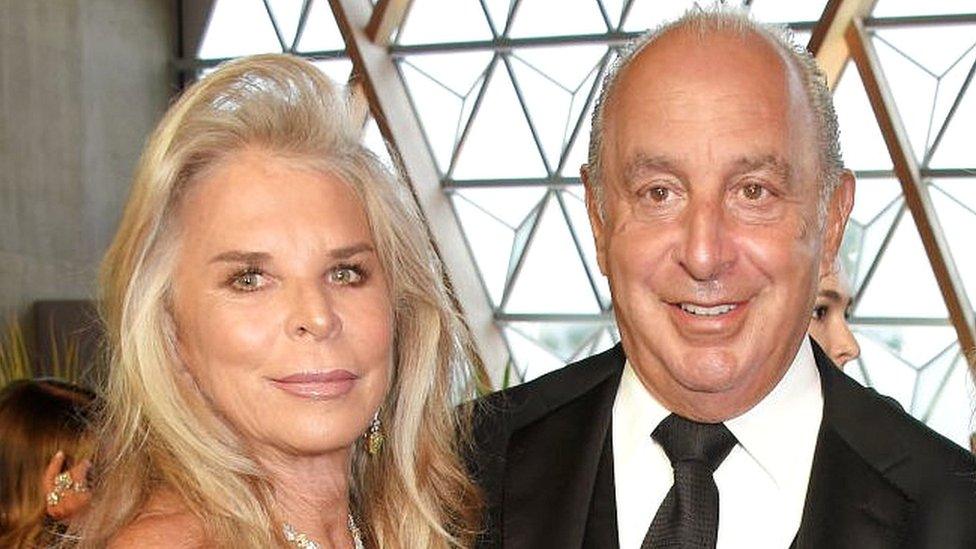
Sir Philip with his wife Lady Green are worth £930m, according to the Sunday Times Rich List
On Sunday, a senior source at Arcadia Group told the BBC's business editor Simon Jack: "We tried to save it a year ago when £200m was put into the business and the pension fund, but it's impossible to operate now.
"You don't know when you'll be open, you don't know what stock to buy."
The whole retail sector is under pressure.
On Friday, menswear retailer Moss Bros launched a restructuring of its business after it said trading had been "severely impacted" by Covid-19.
Earlier this month, fashion chains Peacocks and Jaeger were placed into administration after owner Edinburgh Woollen Mill Group failed to find a buyer.

Who is Sir Philip Green?
Sir Philip bought Arcadia Group in 2002. His wife, Lady Cristina Green, is the majority owner of its parent company Taveta Investments.
Monaco, models and money – who is retail mogul Sir Philip Green?
The couple are worth £930m, according to the Sunday Times Rich List.
Much of their wealth is derived from a £1.2bn dividend payment Sir Philip took from Arcadia and paid to his wife in 2005. Since Lady Green is a resident in Monaco, it was paid to her tax-free.
In a colourful career, Sir Philip has been both lauded as the "King of the High Street" and branded the "unacceptable face of capitalism".

What's the issue with pensions?
Adding to the uncertainty facing the thousands of Arcadia staff is an estimated £350m hole in the company's pension fund which has 10,000 members.
On Sunday, the chair of the Work and Pensions Committee, Stephen Timms, called on the Green family to plug the gap.
"Whatever happens to the group, the Green family must make good the deficit in the Arcadia pension fund," the Labour MP said, adding he would raise the matter with the Pensions Regulator.
Pensions consultant John Ralfe told the BBC that if Sir Philip used his personal wealth to plug the hole in the Arcadia pension pot, that would ensure workers enrolled in the scheme received their full pension.
But he said that even if he did not provide a full top up, Arcadia workers should still receive the majority of their pension entitlement through the Pension Protection Fund.
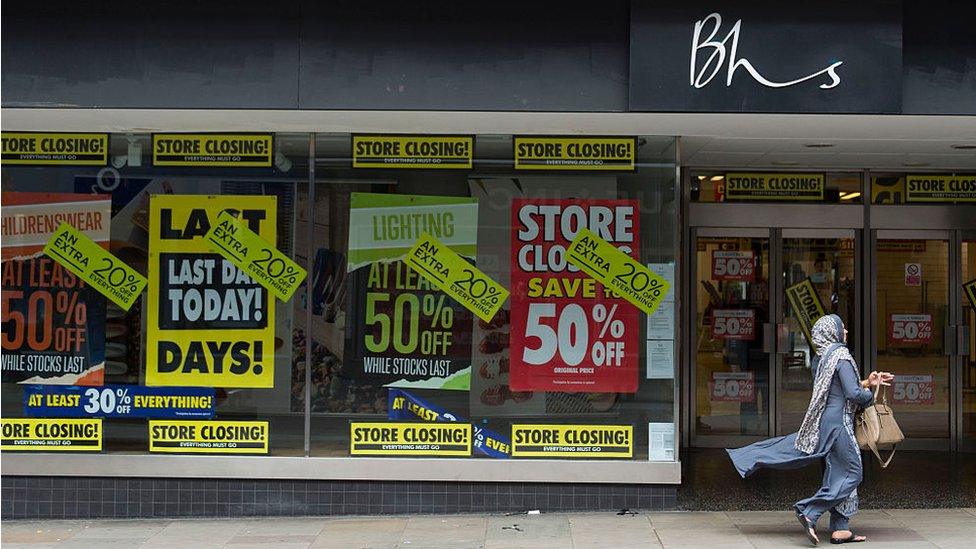
Sir Philip sold BHS for £1 in 2015, a year before it went bust with a £571m pension deficit
Sir Philip previously faced controversy for selling off BHS, the former department store chain, for £1 to businessman Dominic Chappell. The following year, BHS went bust with the loss of 11,000 jobs and a pension deficit of £571m.
Sir Philip reached a deal with the Pensions Regulator to inject £363m into that scheme. Meanwhile, Mr Chappell was recently sentenced to six years for tax evasion.
What's the link to Debenhams?
The collapse of Arcadia could affect Debenhams as it is feared it could scupper a sale of the department store chain to JD Sports.
Arcadia is the biggest concession in Debenhams, accounting for about £75m of sales. It sells brands such as Miss Selfridge and Evans at the department store group
JD Sports had been closing in on a rescue deal to buy Debenhams, which is currently in administration for the second time in a year.
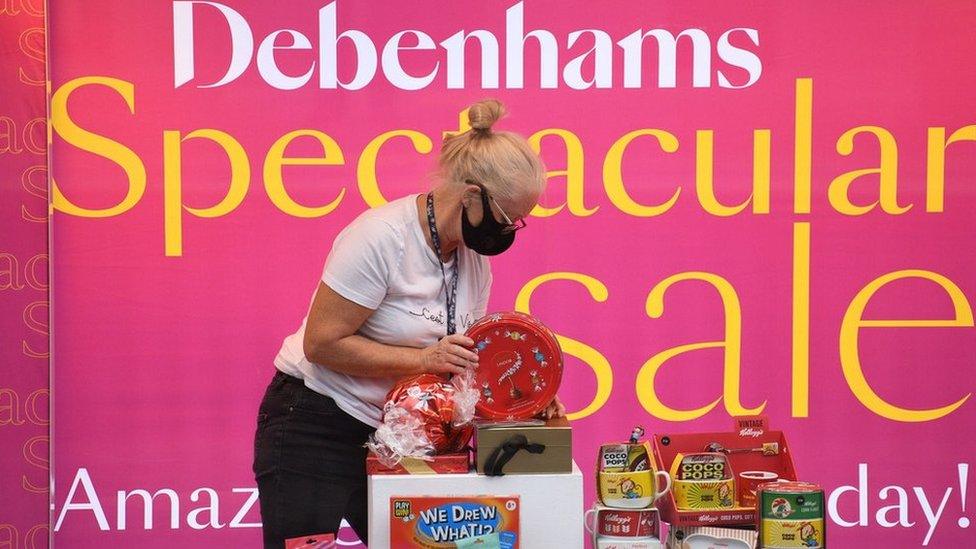
There are fears Arcadia's expected collapse could affect the future of Debenhams
Debenhams has already cut about 6,500 jobs since May, and now has about 12,000 employees across 124 stores.
According to a source close to the JD Sports, the appointment of administrators to Arcadia would give the company "more to think about".
What's next for Arcadia?
Some stores could close, but Arcadia's brands are household names, and are likely to survive in some form.
Boohoo is seen as a potential buyer for some of its big name brands, such as Topshop.
In the past it has bought struggling brands Oasis, Warehouse, Karen Millen and Coast.
Arcadia's 13,000 workers face an anxious wait. One told the BBC: "I'm really worried about what is going to happen to us, especially as it is so close to Christmas.
"It's already been a very tough time, I'm in a role where I can work from home, but I'm not relying on anything being there for me - I've started applying for other jobs."
Holders of vouchers and gift cards with the various Arcadia brands also face uncertainty - with the risk that these cards will become worthless.
Administrators and any future owners will decide whether they will be accepted.
If the brand folds, then cardholders are owed the money, but are a long way down on the priority list of creditors who need to be paid back after assets are sold.
The BBC's business correspondent, Dominic O'Connell, says as with many other clothing retailers struggling with the pandemic shutdown, insolvency looks the only option.
But, he says, two questions remain: Can the individual businesses find new owners to take them on, and what amount of public pressure will there be on the Greens to make good any shortfall in the Arcadia pension schemes?

Are you an Arcadia employee? Share your experiences by emailing haveyoursay@bbc.co.uk, external.
Please include a contact number if you are willing to speak to a BBC journalist. You can also get in touch in the following ways:
WhatsApp: +44 7756 165803
Tweet: @BBC_HaveYourSay, external
Please read our terms & conditions and privacy policy
If you are reading this page and can't see the form you will need to visit the mobile version of the BBC website to submit your question or comment or you can email us at HaveYourSay@bbc.co.uk, external. Please include your name, age and location with any submission.
- Published28 November 2020
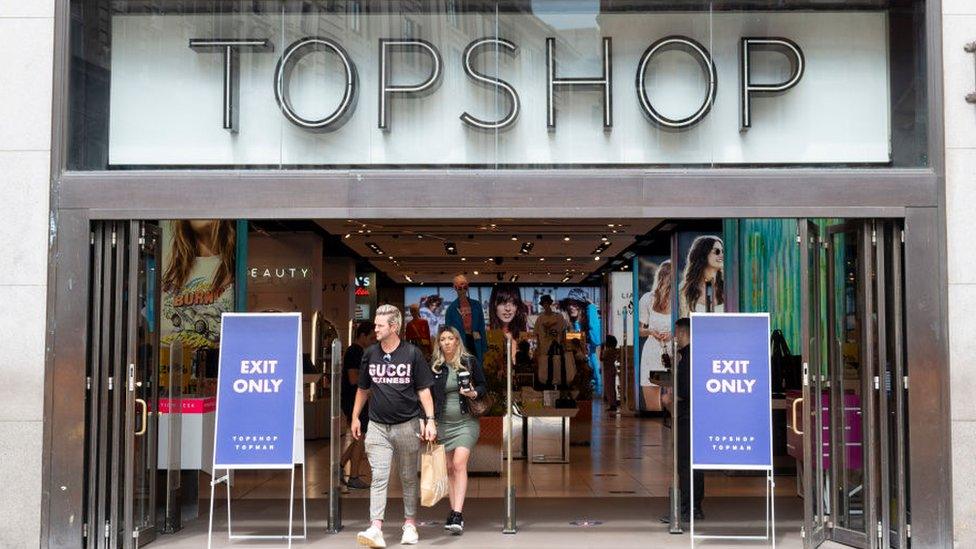
- Published27 November 2020
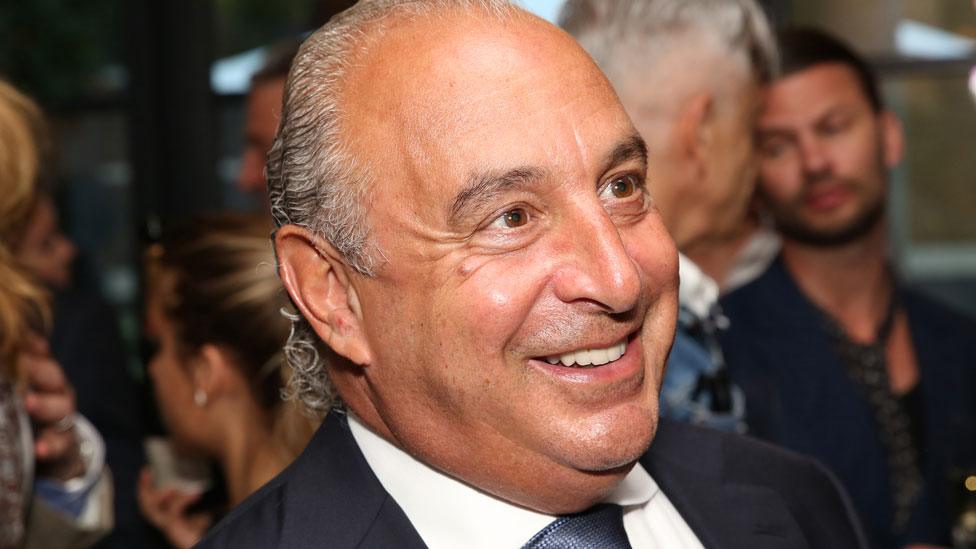
- Published22 November 2020
